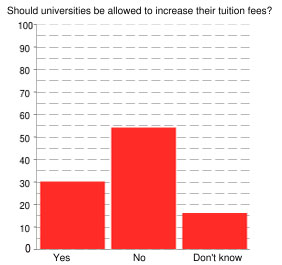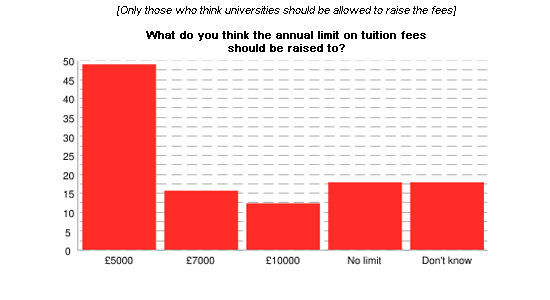The majority of the British public are unhappy with many of the university funding recommendations suggested by Lord Browne's review on the issue, our poll has found.
- 54% think that universities should not be allowed to increase their tuition fees from the current annual level of £3,290.
- 77% believe that higher tuition fees would deter students from lower-income households from going to university.
- Of the 30% who thought that universities should be allowed to raise fees, the largest proportion (44%) thought they should be capped at £5,000. Only 14% supported the £7,000 Browne is rumoured to recommend.
Grad tax
- Suggestions that university leavers who earn more should pay back more money than those on lower incomes did not go down well with the public either, with 55% saying students should pay the same fees regardless of their earnings.
- 44% believe that the current system of loans, repayable after a graduate has started earning, is much fairer than the idea of graduate tax.
- However, the public is marginally in favour of the idea that students should have to pay for the bulk of their university education rather than receive funding from the state, with 44% feeling that it is fair compared to 41% who disagree.
- 54% believe that it is wrong that the university sector is suffering from some of the biggest cuts in a bid to reduce the deficit in the first place, saying that ‘in the long run it will damage Britain’.
 State studentship
State studentshipHigher education sees higher costsThe issue of university funding has divided the Coalition Government, as prior to May’s election, the Liberal Democrats had pledged to fight raising university fees in their campaign manifesto.The Browne review hints at bleak news as it recommends lifting the cap on tuition fees. The current cap means that students pay £3,290 per year, but Browne is allegedly proposing that universities have the choice to charge more. However, if fees rise above £7,000, the university will only be allowed to keep a significantly smaller proportion. Notwithstanding, our data suggests that this may not be sufficient source of consolation for many.
 Survey details and full results
Survey details and full results




